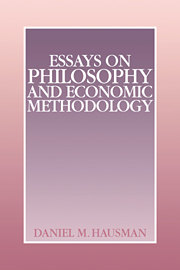Book contents
- Frontmatter
- Contents
- Introduction: What is philosophy of economics?
- PART I METHODOLOGY AND THEORY APPRAISAL
- PART II CAUSALITY IN ECONOMICS
- PART III CASES AND PUZZLES
- 12 What are general equilibrium theories?
- 13 Arbitrage arguments
- 14 Explanatory progress in economics
- 15 On dogmatism in economics: the case of preference reversals
- PART IV POSTSCRIPTS
- Bibliography of relevant writings by Daniel M. Hausman
- Bibliography of works by other authors
- Index
13 - Arbitrage arguments
Published online by Cambridge University Press: 05 June 2012
- Frontmatter
- Contents
- Introduction: What is philosophy of economics?
- PART I METHODOLOGY AND THEORY APPRAISAL
- PART II CAUSALITY IN ECONOMICS
- PART III CASES AND PUZZLES
- 12 What are general equilibrium theories?
- 13 Arbitrage arguments
- 14 Explanatory progress in economics
- 15 On dogmatism in economics: the case of preference reversals
- PART IV POSTSCRIPTS
- Bibliography of relevant writings by Daniel M. Hausman
- Bibliography of works by other authors
- Index
Summary
Consider the following famous argument, which motivates accepting the hypothesis of rational expectations.
(RE: Rational expectations argument) I should like to suggest that expectations, since they are informed predictions of future events, are essentially the same as the predictions of the relevant economic theory. … If the prediction of the theory were substantially better than the expectations of the firms, then there would be opportunities for the “insider” to profit from the knowledge – by inventory speculation if possible, by operating a firm, or by selling a price forecasting service to the firms. The profit opportunities would no longer exist if the aggregate expectation of the firms is the same as the prediction of the theory: …
(Muth 1961, pp. 316, 318)This is a powerful argument, although some reasonable doubts may remain. The phrase “the predictions of economic theory” is elliptical in an important way, for economic theory makes predictions only with the help of information concerning initial conditions, which may not be shared by various economic agents. Furthermore, it might be the case that economists cannot make a killing not because the expectations of firms match the predictions of economic theory, but because the expectations of firms are superior to economic theory. One is also reminded of Keynes's strikingly successful efforts on the stock market on behalf of King's College. But clearly there is something to the argument – enough to convince many talented economists to take seriously the rational expectations hypothesis.
Information
- Type
- Chapter
- Information
- Essays on Philosophy and Economic Methodology , pp. 172 - 185Publisher: Cambridge University PressPrint publication year: 1992
